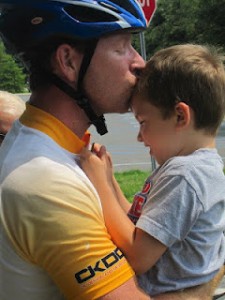An Interview with Jerry Turning
Today we’re featuring an interview with Jerry Turning, autism dad extraordinaire and writer of Bacon and Juice Boxes: Our Life With Autism. Jerry’s straight talking blog about his son, Eric, reflects the thoughts of countless other parents with children with autism: fear for their child’s future, anger at societal reactions to autism, but also inspiration, pride, and a whole lotta love. In our interview, Jerry discusses his acceptance of his son’s diagnosis, how he relearned the value of pure and simple play, and how his family works to encourage communication with Eric.
Your latest blog post discusses the importance of accepting the differences that autism causes. Can you tell us a bit about your experiences discussing those differences with Eric’s teachers and other people that he interacts with?
This whole thing has been a remarkable journey for my family emotionally, spiritually, and every other way. Accepting that my son’s path will be different and embracing his uniqueness has been a slow progression. I had to let go of some deeply-held beliefs and convictions of what I imagined raising a son entailed. I have learned that most of the things I thought were important just aren’t.
Eric’s teachers and therapists have been the key to this evolution. They have taught me that his physical stimming and vocalizations have meaning; that his obsessions can be valuable keys to communicating with him; that his delays in expressive language do not necessarily correlate with an inability to understand and comprehend language. But most of all, they have taught me to just relax and enjoy my son. I used to run around like my hair was on fire trying to get him to act “normal.” I’m almost ashamed to admit that now. But I think it’s important to convey these things to the moms and dads out there who are just beginning their journey.
I was particularly struck by your “Accept or Attack” post, in which you discuss accepting the diagnosis vs. throwing every possible treatment program at it. What types of speech therapy treatments have you used to encourage communication?
Yes, like I mentioned in that post, I find myself smack-dab in the middle of those two poles. I accept his uniqueness and special path, but we still aggressively pursue a wide range of therapies that we feel address some of his needs both clinically (gut issues, etc.) and behaviorally. Eric attends regular speech therapy sessions both integrated in his school day and through an outside therapist. Expressive language has been his biggest hurdle. He has a wide vocabulary but his language is very… rote, I guess is the word. For example, he can tell us that he wants bacon: “Can…. I …. Have… Bacon… Please?” But our focus now is honing his language to a more natural, less robotic sounding communication.
Does Eric have an Individualized Education Program (IEP) and what type of services does he receive in school?
Yes, he does have an IEP. I must say our school system has been very accommodating and wonderful to deal with. (I hear horror stories about battles and wars between parents and their schools). He is in a small autism-only class at a public school with only three other children in his class. The class has a teacher and three aides. He receives regular speech, ABA and OT. Inclusion and eventually mainstreaming has always been our goal. To that end, he is brought into the mainstream music and technology classes regularly and has a lot of interaction with his typical peers on the playground and throughout the day. We are soon beginning a “reverse mainstreaming” experiment where some of his “typical” peers will be brought into his classroom for specific, targeted socialization lessons that we hope will translate outside the classroom.
What types of home-based activities do you do to encourage communication?
We really just try to live our lives when we are at home (not often between therapy sessions). We try to communicate with him naturally and address issues as they arise. We play games with his big sister and try to encourage social interactions as much as possible.
Eric is now seven years old. How has his communication changed?
Actually, he turned eight on Saturday! Expressive language and social skills are still our biggest challenges. But his progress has been remarkable. He continues to prove to us that there is no ceiling to his development. He is starting to show a grasp of more abstract ideas and is really starting to conquer reading! We can’t thank our teachers and therapists enough. They are truly remarkable.
You also have a daughter, Anna, who is a few years older than Eric. How have you explained Eric’s autism to her and how is she coping with it?
Yes, my little girl will be 11 in August. She has had a grasp of Eric’s special needs for years. I think we just sat her down and told her one day that he has autism and “learns differently” than we do. But I honestly don’t think that we needed to. She has always just instinctively understood and embraced his differences as part of our lives. She, besides my wife, is the most remarkable human being I know. She is his biggest cheerleader, most vocal advocate and most tireless teacher. We are truly blessed.
________________________________________________________________________________________________
Thanks so much for sharing your story, Jerry, and happy birthday to Eric!






